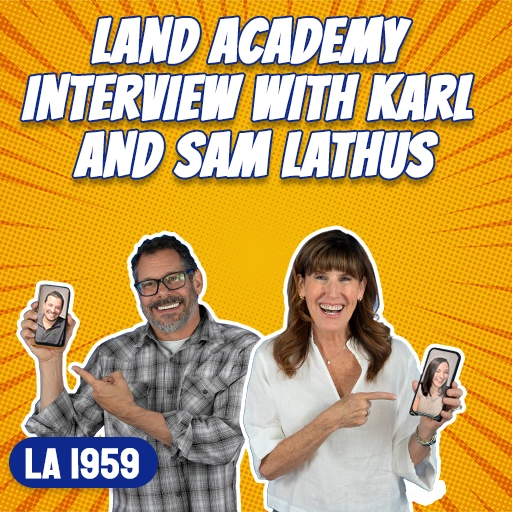Transcript:
Steven Jack Butala:
Steve and Jill here.
Jill K DeWit:
Hi.
Steven Jack Butala:
Welcome to The Land Academy Show, entertaining land investment talk. I’m Steven Jack Butala.
Jill K DeWit:
And I’m Jill DeWit, broadcasting from the Valley of the Sun.
Steven Jack Butala:
Today, Jill and I are going to talk about the three types of land transactions that we do. This is something new that Jill and I just came up with in this current career path that we’re instructing. It seems to be getting really, really good response and I think you should consider doing three types also.
Jill K DeWit:
I was going to pause and talk about for a second… It’s kind of funny, this sounds like… Do you have IT issues too? Does your website go down at random times and you just need help and can’t find a good person? Well, you are not alone. We’re meeting with an IT person today, and we were just talking about… I’m like, “I wonder if anybody else has these same issues we do?” The whole problem about IT is not IT. It’s the contracts and the way people go about it, how much money everybody wants up front, and how the projects never seem to end.
Steven Jack Butala:
Thanks for just blowing this whole thing, Jill.
Jill K DeWit:
I’m so sorry. I just thought that was interesting to hear and understand and share.
Steven Jack Butala:
Right before we turned the camera on for this show, we were talking about what’s going to happen today, and I have to meet with a new tech person, who’s extremely intelligent and a super good guy. But just that industry has gotten to a point where it’s just no fun at all.
Jill K DeWit:
It’s weird.
Steven Jack Butala:
Contracts are real thick, like contracts always get thicker, not thinner.
Jill K DeWit:
Yeah.
Steven Jack Butala:
It costs $25,000.00 to do a website now, bare minimum. It used to cost like $700.00. It’s just all liquid pain.
Jill K DeWit:
Isn’t it funny?
Steven Jack Butala:
It’s so painful to get a website done.
Jill K DeWit:
Do you know you’re right? I remember years ago going to this company that was going to build us a site, and they quoted $25,000.00 back then and I about fell out of my chair. We obviously didn’t do it. We did it ourselves.
Steven Jack Butala:
Right.
Jill K DeWit:
Clearly we did it ourselves back then. If you remember Landacademy.org, that was us. Hey, but we did it and we got here and now we’re like… “If it was only $25,000.00 I’d be fine with that.”
Steven Jack Butala:
Yeah.
Jill K DeWit:
Not so much.
Steven Jack Butala:
It’s more fun to do a podcast times 10 than it is to deal with any IT issues.
Jill K DeWit:
Very true. I’m glad we’re here.
Steven Jack Butala:
Before get into it, thanks for letting us rant. Let’s take a question, posted by one our members, on the Landinvestors.com online community. It’s free, and don’t forget to subscribe to The Land Academy YouTube channel and comment on the show as you like.
Jill K DeWit:
Lance wrote, “How do you price mailers for land in really hot markets?”
Steven Jack Butala:
This is totally on topic for what we’re about to talk about today. You price them higher. We’re going to talk about the three types of deals that Jill and I do. It didn’t come to me, these types of deals, in an organized way. We just sort of organically started doing different types of deals to respond to the market. And so, Lance, I’ll answer your question here in a second. Today’s topic, there are three types of land transactions that we currently do. This is why you’re listening. For some reason we started calling them buckets. Transaction number one is buy for X and double your money, then sell it.
Steven Jack Butala:
This could be in desert squares. We call it a bread-and-butter type land transaction. For us, the prices kept creeping up, so we would start… I mean, a typical deal for me before Jill and I joined forces was buy for $1,500.00 to $2,000.00 and sell for four, five or eight, on the internet five times a day. And so, since then, since Jill got involved, and we’ve made dramatic improvements since then systemically, it’s more like buy for 30, sell for 60. And so that’s a bucket… Our type two real estate deal. We’re doing a deal funding transaction now where it’s buy for 39 and sell for 120. So, that’s would I would call a bucket two, add a zero kind of deal, and we just sort of fell into that.
Steven Jack Butala:
And then certainly bucket three is bigger. Bucket three can be… It’s different for us, it’s different for everybody. But what I want you to do with bucket three is push your limits. You should always be doing something new, trying a new place to send mail. For a lot of people, it’s mobile homes. For us it’s special-use property that we buy for a lot. And then we might do something to it. We might put a shed on it. We might mine or split it, in certain states where you can do that. There are all kinds of things… Maybe add a wow. There are things that you can do that really dramatically enhance that bucket three type specialty-use property. The numbers on that are staggering. Buy for 50, and when it’s all done sell for… You might have put $20,000.00 or $30,000.00 into, maybe even $100,000.00, and then sell for three or four or $500,000.00.
Steven Jack Butala:
And Jill and I have many deals like that going on right now. Which leads me to Lance’s question, because all those deals, those bucket three deals, are in hot markets. In my opinion, it’s much, much harder to do a bucket three transaction that’s in a mediocre, not-as-hot-market. What’s a hot market? Really, just cutting right down to it, a hot market is where the days on market are really low, and where you have a sense of confidence and your confidence is backed by actual transactions and how fast they’re selling, how much they’re selling for. There are properties that Jill and I have purchased and we’re doing stuff to them, it takes six, eight months to do it, maybe more. And it’s a good thing it took six to eight months because the price has dramatically gone up. If we would have sold it six to eight months ago we would not be thinking about… We would not have thought about-
Jill K DeWit:
The numbers were [crosstalk 00:06:20].
Steven Jack Butala:
The positive… The top-line revenue. So, I think it’s always important, and I say this to myself as much as anybody else, to just keep pushing yourself to try new stuff.
Jill K DeWit:
That’s the point I like to make here too. By the way, thank you for having me. It’s nice-
Steven Jack Butala:
You know what, sometimes it’s the Jill show, sometimes it’s my show.
Jill K DeWit:
Exactly. I’ve just got to sit here going, “Do I stop him? Do I help him? Nah, let him run. He’s doing great.” You don’t need me today. I’m just quietly over here sipping my coffee, nodding my head.
Steven Jack Butala:
Well seriously, what do you think?
Jill K DeWit:
No, I totally agree with you. It’s like you start off with one type. It’s going to naturally happen the longer you stay in this, I think, because that’s how it went for us. You’re going to start off with one type, and whatever it is that’s your comfort zone and it’s usually what you have in your checking account. Seriously, that’s how a lot of people are. They’re like, “I don’t want to use anybody else’s money. I don’t want to make mistakes. I don’t want to be embarrassed and really screw anything up. I’m going to screw up my own money right now, figure a few things out.” And I do like that. I want you to get some deals out of the way.
Jill K DeWit:
As much as we talk about going for it and adding a zero, you do need to get a couple of transactions done all the way through, all by yourself, really to understand the whole process. That is the best before you start adding layers. You start with the little things. Jump in any time.
Steven Jack Butala:
No, go ahead.
Jill K DeWit:
You start with whatever you’re comfortable with, get five or 10 of those out of the way. And while you’re doing it you’re eyes are going to start opening up to like, “Huh, what’s possible here? Why am I buying for $1,000.00? That guy’s buying for $10,000.00. He closed faster than I did, because I’m following this all in The Land Academy community, so maybe I should be doing that.” Yep, and here comes layer number two, or type number two, which is usually just adding numbers. That’s how I see it.
Steven Jack Butala:
Yeah.
Jill K DeWit:
Going bigger, just what you’re doing already. Just looking around going, “I’m not messing around with five acres any more. I’m going for the 20’s and the 40 acres, because they’re worth way more money and I could just do the same amount of work, make 10 times as much money.” That’s just going to happen. And then the third type is, like you said, you’re going to find some niche out there. You’re going to have a specialty, and it may not even be a property type, it may be transactions that nobody wants to do. Maybe there are some probate things, maybe there are some tax situations, I don’t know. You’re going to stumble across something that’s harder for people to undo, or they don’t understand it, or they’re just unwilling to do it. And you’re going to go, “I will take all of those, everyone.” It’s great because there are so many possibilities out there in so many counties. Oh my gosh, 3144, that’s a lot of counties and parishes in this country. You could be in one state undoing problems for probably your whole career, and do very well. Thank you.
Steven Jack Butala:
Well said, Jill.
Jill K DeWit:
Thank you very much. Happy you could join us today. Five days a week you can find us here on The Land Academy show.
Steven Jack Butala:
Tomorrow, the episode on The House Academy show is called The Best Place to Buy Houses Right Now: You Are Not Alone in Your Real Estate Ambition.
Jill K DeWit:
I think everyone’s going to want to hear that.
Steven Jack Butala:
Yeah, buckets, I love buckets. I don’t know why we haven’t really been loud about it in the past, but we’ve been running the bucket concept for awhile.
Jill K DeWit:
Mm-hmm (affirmative), and sometimes it… We probably have 10 different buckets, when you think about it, because there’s not only just the property types that we do with land, but with deal funding there’s different buckets there, how the percentages are and what type of deals they are, and how much work things need. And then your buckets and my buckets, there are things that you want to do and you’re comfortable with and there are things that I’m over here doing, and we don’t even really talk about it.
Steven Jack Butala:
Right.
Jill K DeWit:
We’re just kind of like, “Know and trust the other person, who knows what they’re doing, and by now I think we’ve got this.” Thank you for tuning in. If you are a Land Academy member, make sure that you are joining us and connecting and talking with us on discord.
Steve and Jill:
We are Steve and Jill.
Steven Jack Butala:
Information-
Jill K DeWit:
And inspiration.
Steven Jack Butala:
To buy undervalued property.















